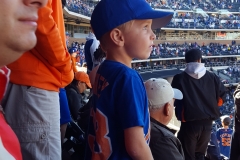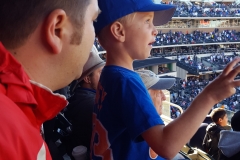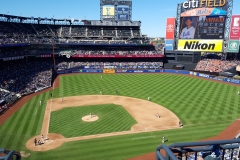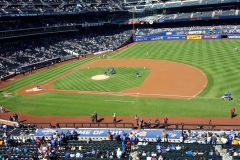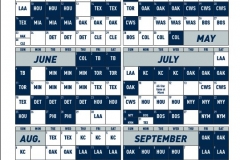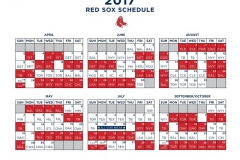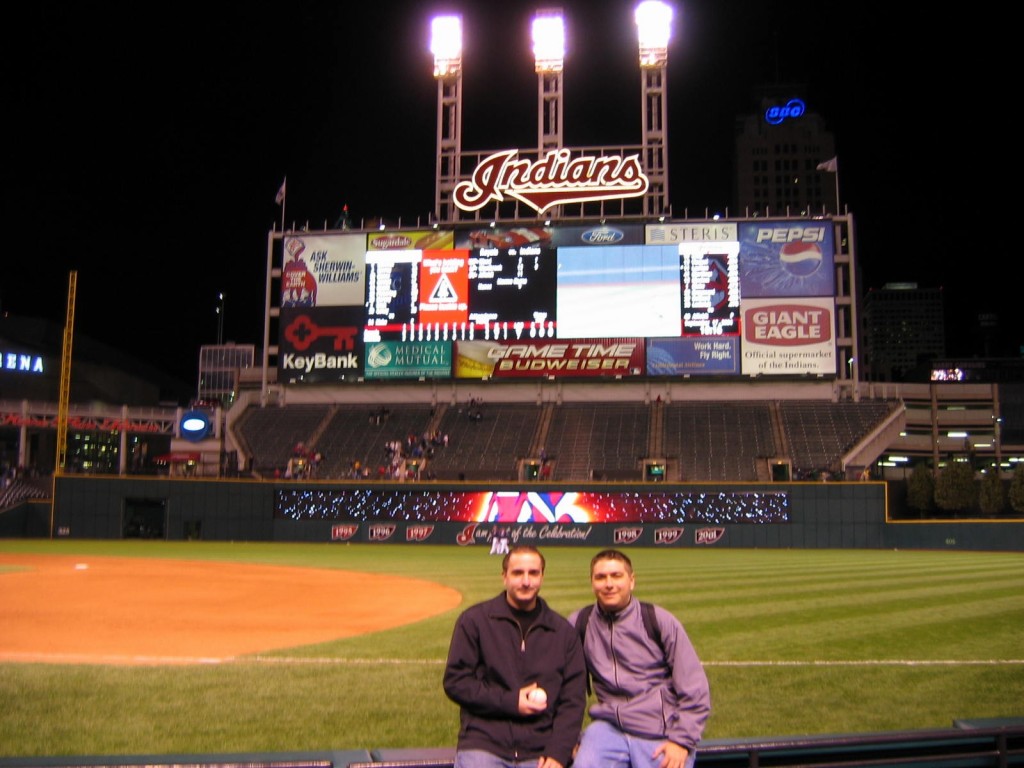
September 17, 2004: Cleveland, Ohio
Cleveland, Ohio was the second leg of our Midwestern Ballpark tour. Mike and I drove from Cincinnati on a rainy Friday afternoon. We were worried that the 7:10 game would be rained out, but were happy to see the weather improve as we neared our destination. The Cleveland Indians are one of the American League’s most historic organizations. They were the first integrated American League team; Larry Doby took the field for the Tribe in 1949. Since that historic day, the Cleveland Indians and their fans have shared some of the worst seasons in baseball history. After losing the 1954 World Series to the underdog New York Giants, the Indians spent the next 41 years on the bottom of the American League standings. Never mind returning to the World Series; the Indians could only muster a top three finish in four of those 41 years. The Indians and their loyal fans were given something to cheer about in 1994 when Progressive Field (formerly Jacobs Field) opened. The opening of Progressive Field coincided with the arrival of future All-Stars Manny Ramirez, Jim Thome, Albert Belle, Kenny Lofton, Carlos Baerga and Sandy Alomar. A winning decade was to follow; the Indians won the American League pennant in 1995 and 1997 and made the playoffs in 1996, 1998, 1999 and 2001. The Indians enjoyed the greatest stretch in the franchise’s 115-year history. The impact Progressive Field had on the franchise was immeasurable; it put Cleveland back on the baseball map and encouraged fans to flood the ballpark. Mike and I were happy to find a Sheraton Hotel located within walking distance of Progressive Field and the Rock and Roll Hall of Fame, just another site to see while in Cleveland. Our hotel room had a great view of Lake Erie and First Energy Stadium, which is located on the same site as old Cleveland Stadium (aka “The Mistake by the Lake”). After settling in, Mike and I decided to catch a pregame meal. We decided on a Caribbean restaurant called Key West, located in a downtown galleria. For some reason or another, Caribbean food is a big part of the Cleveland restaurant culture. Progressive Field actually offers a Cuban sandwich. While eating, the weather took a turn for the worse. The clouds rolled in and the wind began to howl; this wasn’t exactly optimal baseball weather, but we were in town only for the night. So after a great dinner, it was back to the hotel for an extra shirt and pair of socks before heading out to the Jake.
Although the game between the hometown Cleveland Indians and Kansas City Royals meant nothing in the standings, I was looking forward to seeing the Indians’ young lineup in action. Indians’ catcher Victor Martinez and designated hitter Travis Hafner were putting up the best numbers for players at their positions in Major League Baseball. The Royals had high hopes coming into the 2004 season, but injuries and poor pitching made the month of September a showcase for their young players, like John Buck and David DeJesus. The weather kept many fans away that evening; Mike and I were two of only 14,347 in attendance. With that much room to roam in Progressive Field, we enjoyed the game from different angles. One of these put us in prime position to catch a foul ball, which is now proudly displayed in Mike’s home. A 3-4, 3-RBI game by David DeJesus and an Abraham Nunez inside-the-park home run helped the Royals to a 6-4 win. After the game, Mike and I hit a few local bars to experience Cleveland nightlife. I enjoyed its laid-back style. Everyone was friendly and the local brews were excellent, but we could not stay out all night. We had to wake up in the next morning and visit the Rock and Roll Hall of Fame before driving to Pittsburgh, our third city in as many days.
Since its opening, the Rock and Roll Hall of Fame has made Cleveland a destination. Mike and I were excited to see unique exhibits, many of which were personal items of the artists. The Rock and Roll Hall of Fame attracts all types of individuals. Great music, like baseball, stands the test of time. It allows a connection to be made throughout history. Music defines generations; it brings its audience a constant experience while the world around them has changed. Baseball provides its audience with a similar experience.
